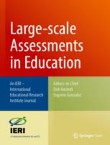Citation Impact 2023
Journal Impact Factor: 2.6
5-year Journal Impact Factor: 4.2
Source Normalized Impact per Paper (SNIP): 1.943
SCImago Journal Rank (SJR): 1.256
Speed 2023
Submission to first editorial decision (median days): 28
Submission to acceptance (median days): 324
Usage 2023
Downloads: 418,474
Altmetric mentions: 133
